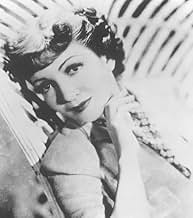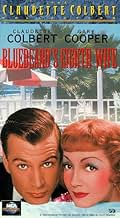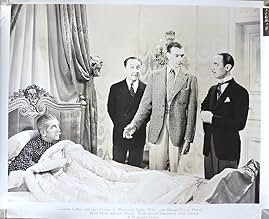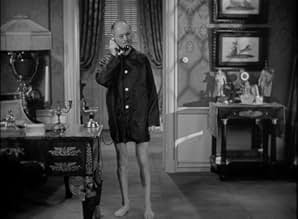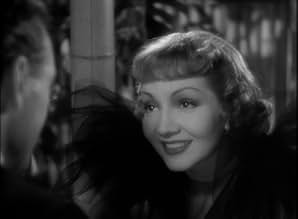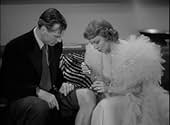IMDb RATING
7.1/10
5.1K
YOUR RATING
After learning her multi-millionaire fiancé has already been married seven times, the daughter of a penniless marquis decides to tame him.After learning her multi-millionaire fiancé has already been married seven times, the daughter of a penniless marquis decides to tame him.After learning her multi-millionaire fiancé has already been married seven times, the daughter of a penniless marquis decides to tame him.
- Awards
- 2 wins total
Mariska Aldrich
- Nurse at Door
- (uncredited)
Leon Ames
- Ex-Chauffeur
- (uncredited)
Lenore Aubert
- Party Guest
- (uncredited)
Eugene Borden
- Waiter on the Stairs
- (uncredited)
Barlowe Borland
- Uncle Fernandel
- (uncredited)
7.15.1K
1
2
3
4
5
6
7
8
9
10
Featured reviews
Continuous shift
Oh Lubitsch how we needed you. Others could elicit fiery performances from actors, captivate with riveting story or lavish us with sets and camera magic. These usually require to be propped up with some effort, but what Lubitsch does simply requires letting go of, in particular letting go of our need to prop up fiction a certain way.
Usually understood as a gift for wit, his famed 'Lubitsch touch' is actually a mastery of something else, spontaneous illogicality. I have written about him in a few other posts so will not bore you here. It's the continuous shift of context, the dismantling of our expectation that story plays out a certain way.
The story could be anything, here a man and woman court each other while vacationing in the French Riviera. He's the blustering American type who won't take no and won't tiptoe around European niceties. She's elegant and smart but will not stoop to be wowed by money like her shyster father.
In the usual mode, they would brush and bounce off each other whilst trying to top each other for control over the story. This as hardwon love that surprises. That's fine, plenty of enjoyable films were being made in this time, what we now know as screwball. For me it's all a matter of how we brush, how much narrative space the players create by pushing and pulling, in which self can take shape, actual visible shape, as the story we watch. Capra has a very agile touch in It Happened One Night. I happen to find His Girl Friday coarse, par the course for Hawks.
In Lubitsch's world, we shift and shift again in a jazz merry-go-round of elusive self. Here's some of it. They meet as strangers in a store, cooperating over trying to buy pyjamas. He decides he's smitten, but uses money to come close to her. So what happens? She agrees to be bought as a wife but gives him a thankless marriage for it, although in love herself.
This is lovely work, clean, vibrant. Some if are just gags, like having married seven times before her. But quite a bit of it is that wondrous surprise where emotions express themselves in paradoxical ways.
Usually understood as a gift for wit, his famed 'Lubitsch touch' is actually a mastery of something else, spontaneous illogicality. I have written about him in a few other posts so will not bore you here. It's the continuous shift of context, the dismantling of our expectation that story plays out a certain way.
The story could be anything, here a man and woman court each other while vacationing in the French Riviera. He's the blustering American type who won't take no and won't tiptoe around European niceties. She's elegant and smart but will not stoop to be wowed by money like her shyster father.
In the usual mode, they would brush and bounce off each other whilst trying to top each other for control over the story. This as hardwon love that surprises. That's fine, plenty of enjoyable films were being made in this time, what we now know as screwball. For me it's all a matter of how we brush, how much narrative space the players create by pushing and pulling, in which self can take shape, actual visible shape, as the story we watch. Capra has a very agile touch in It Happened One Night. I happen to find His Girl Friday coarse, par the course for Hawks.
In Lubitsch's world, we shift and shift again in a jazz merry-go-round of elusive self. Here's some of it. They meet as strangers in a store, cooperating over trying to buy pyjamas. He decides he's smitten, but uses money to come close to her. So what happens? She agrees to be bought as a wife but gives him a thankless marriage for it, although in love herself.
This is lovely work, clean, vibrant. Some if are just gags, like having married seven times before her. But quite a bit of it is that wondrous surprise where emotions express themselves in paradoxical ways.
Absolutely Delightful
'Absolutely delightful' sounds a bit twee doesn't it? The mid-thirties were awash with so-called 'sophisticated comedies' all pretty bland and predictable. This however has something special about it. It's not quite a laugh out loud comedy but it's genuinely charming and guaranteed to leave you a happier person.
What makes this a class above most offerings from 1938 is that you can't help loving the characters. Clearly it's easy to fall in love with Claudette Colbert but Gary Cooper's millionaire is surprisingly endearing too. He was excellent in the brilliant comedy BALL OF FIRE with Barbara Stanwyck but because you associate Gary Cooper with stoic, serious roles, when he's in a comedy, a genuinely funny comedy and he is genuinely funny himself, it really makes an impression. He's still every inch, the man's man but also oblivious to the ways of the fairer sex. That he tries to learn about how to treat troublesome women by reading The Taming of the Shrew is a classic piece of comedy.
Lubitsch was the undisputed master at making a simple battle of the sexes movies witty, loading it with sexual frustration and innuendo whilst still making it utterly charming.....but this was no simple battle of the sexes movie - this was written by Charles Bracket and Billy Wilder so Lubitsch didn't have to try too hard. Like any good comedy, the humour comes from your belief in the realness of the characters and this is such a well crafted 'rom com' that you're completely drawn into this silly but lovely picture. When it ends, you are smiling and you feel like applauding!
And of course, Claudette Colbert looks like a goddess!
What makes this a class above most offerings from 1938 is that you can't help loving the characters. Clearly it's easy to fall in love with Claudette Colbert but Gary Cooper's millionaire is surprisingly endearing too. He was excellent in the brilliant comedy BALL OF FIRE with Barbara Stanwyck but because you associate Gary Cooper with stoic, serious roles, when he's in a comedy, a genuinely funny comedy and he is genuinely funny himself, it really makes an impression. He's still every inch, the man's man but also oblivious to the ways of the fairer sex. That he tries to learn about how to treat troublesome women by reading The Taming of the Shrew is a classic piece of comedy.
Lubitsch was the undisputed master at making a simple battle of the sexes movies witty, loading it with sexual frustration and innuendo whilst still making it utterly charming.....but this was no simple battle of the sexes movie - this was written by Charles Bracket and Billy Wilder so Lubitsch didn't have to try too hard. Like any good comedy, the humour comes from your belief in the realness of the characters and this is such a well crafted 'rom com' that you're completely drawn into this silly but lovely picture. When it ends, you are smiling and you feel like applauding!
And of course, Claudette Colbert looks like a goddess!
who wears the tops, who wears the pants
Ernst Lubitsch is the guiding hand behind "Bluebeard's Eighth Wife," a 1938 comedy starring Claudette Colbert and Gary Cooper. The screenplay was written with a light touch by Brackett and Wilder.
The story concerns a wealthy man, Michael Brandon (Cooper), who meets the very attractive Nicole De Loiselle (Colbert) in a Parisian men's department store. Brandon wants to buy the top of the pajamas, as that's what he sleeps in, but the clerk insists that he buy the entire set. Nicole enters and buys the pants.
Nicole's father (Edward Everett Horton) is a penniless marquis, trying to sell a project to Brandon, who isn't interested. The marquis then attempts to get him to buy a Louis IV bathtub. When he realizes that Nicole is the marquis' daughter, the marquis sees immediately that there is interest and tries to get them together. After all, he's loaded, and the hotel bill is due.
Finally, the couple does become engaged and of course the marquis brings in his entire family at his expense for the wedding. While everyone is gathering for a photograph, some white stuff falls out of Michael's suit. "What is that?" she asks. "It's rice," he says. "Don't you use it at weddings? It's supposed to bring good luck." "Did your bride and groom have good luck?" she asks. "Well," he says, "we had a pleasant six months."
She then finds out he's been married seven times. After renegotiating some sort of prenup he has set up, she goes through with the wedding, but they live separate lives.
For some reason, people put this film in the same category as I Met Him in Paris because they're on the same DVD and they both take place in Paris. I Met Him in Paris is not a Lubitsch film and has some problems. This film has a fine script, zips along at a great pace, and has some wonderful scenes. I Met Him in Paris didn't really pick up until the second part.
Gary Cooper and Claudette Colbert are delightful. It's hard to believe that someone like Gary Cooper actually existed - tall, drop dead gorgeous, and a cowboy to boot. Talk about your perfect man. And what a smile.
Colbert is flawless in acting and in beauty - I saw her up close in 1974 and she looked the same as she did in this film. For as much success that she had, I don't think she ever received the credit for her dramatic work that she deserved, though she did for her comedy.
In her last appearance, in The Two Mrs. Grenvilles, she played an actual person, Elsie Woodward (name changed in the movie), and people who knew Elsie said Colbert was totally the character.
I don't think this is Lubitsch's best, but it's still delightful. How can you miss with those stars, that director, and those writers.
David Niven has a supporting role as an employee of Brandon's who is also a friend of Nicole's. He's very funny.
The story concerns a wealthy man, Michael Brandon (Cooper), who meets the very attractive Nicole De Loiselle (Colbert) in a Parisian men's department store. Brandon wants to buy the top of the pajamas, as that's what he sleeps in, but the clerk insists that he buy the entire set. Nicole enters and buys the pants.
Nicole's father (Edward Everett Horton) is a penniless marquis, trying to sell a project to Brandon, who isn't interested. The marquis then attempts to get him to buy a Louis IV bathtub. When he realizes that Nicole is the marquis' daughter, the marquis sees immediately that there is interest and tries to get them together. After all, he's loaded, and the hotel bill is due.
Finally, the couple does become engaged and of course the marquis brings in his entire family at his expense for the wedding. While everyone is gathering for a photograph, some white stuff falls out of Michael's suit. "What is that?" she asks. "It's rice," he says. "Don't you use it at weddings? It's supposed to bring good luck." "Did your bride and groom have good luck?" she asks. "Well," he says, "we had a pleasant six months."
She then finds out he's been married seven times. After renegotiating some sort of prenup he has set up, she goes through with the wedding, but they live separate lives.
For some reason, people put this film in the same category as I Met Him in Paris because they're on the same DVD and they both take place in Paris. I Met Him in Paris is not a Lubitsch film and has some problems. This film has a fine script, zips along at a great pace, and has some wonderful scenes. I Met Him in Paris didn't really pick up until the second part.
Gary Cooper and Claudette Colbert are delightful. It's hard to believe that someone like Gary Cooper actually existed - tall, drop dead gorgeous, and a cowboy to boot. Talk about your perfect man. And what a smile.
Colbert is flawless in acting and in beauty - I saw her up close in 1974 and she looked the same as she did in this film. For as much success that she had, I don't think she ever received the credit for her dramatic work that she deserved, though she did for her comedy.
In her last appearance, in The Two Mrs. Grenvilles, she played an actual person, Elsie Woodward (name changed in the movie), and people who knew Elsie said Colbert was totally the character.
I don't think this is Lubitsch's best, but it's still delightful. How can you miss with those stars, that director, and those writers.
David Niven has a supporting role as an employee of Brandon's who is also a friend of Nicole's. He's very funny.
yes - a misfire
I have to agree with other reviews I've seen of this movie - despite some funny scenes and good lines, as a whole it just doesn't get off the ground, and Gary Cooper is wrong in the role of the much-married millionaire. Having said that, I love the scene where Claudette Colbert's character, talking about her financial difficulties, says: "Have you ever had a waiter look at you with untipped eyes? And when I ask the elevator boy for the fourth floor, he says 'Yes, Madame' and takes a detour through the basement." A small detail: in one scene Colbert is looking at a book called "Live Alone and Like It" which was an actual best-seller at the time.
One of Lubitsch's lesser movies.
One of Ernest Lubitsch's lesser known films but an essential part of the canon nevertheless and why wouldn't it be with its Charles Brackett/Billy Wilder screenplay and with Cooper and Colbert as the leads. It's as frivolous as they come with Cooper and Colbert meeting cute over a pair of pajamas and marrying in a flash making Colbert Cooper's eighth wife but one determined that if there is to be a ninth then at least Claudette will come out of it rich.
Throw in David Niven, Edward Everett Horton, Franklin Pangborn and Elizabeth Patterson and you have the perfect cast. Of course, it's all very silly but it may also be proof that silliness might just have been what Cooper was best at while his leading lady is simply perfection. Belly laughs are largely absent; this is a slight affair by Lubitsch standards but even minor Lubitsch is a treat.
Throw in David Niven, Edward Everett Horton, Franklin Pangborn and Elizabeth Patterson and you have the perfect cast. Of course, it's all very silly but it may also be proof that silliness might just have been what Cooper was best at while his leading lady is simply perfection. Belly laughs are largely absent; this is a slight affair by Lubitsch standards but even minor Lubitsch is a treat.
Did you know
- TriviaThis was the first collaboration of director Ernst Lubitsch with writers Charles Brackett and Billy Wilder. At their first production meeting, Lubitsch posed this question: "How do the boy and girl get together?". Wilder promptly suggested that the opening scene should be in the men's shop of a department store. "The boy is trying to buy a pajama," he extemporized, "but he sleeps only in the tops. He is thrifty so he insists on buying ONLY the tops. The clerk says he must buy the pants, too. It looks like a catastrophe. Then the girl comes into the shop and buys the pants because she sleeps only in the pants." Lubitsch and Brackett were enchanted with this idea. Months later, they discovered that Wilder himself was a pajama tops-only sleeper and had been contemplating this idea for months, waiting for a chance to use it in a comedy.
- GoofsWhen Nicole shuts the door to her part of the apartment to keep Michael out, the door can be heard being locked. However, there is no keyhole or lock visible on either side of the door.
- Quotes
Nicole de Loiselle: [sarcastically] Mr. Brandon, you're terrific. You're gigantic! You're - you're breathtaking. I wish someone would tell you what I really think of you.
- ConnectionsFeatured in The Great Canadian Supercut (2017)
- SoundtracksHere Comes Cookie
(1935) (uncredited)
Music and Lyrics by Mack Gordon
Performed by Gary Cooper (vocal and piano)
- How long is Bluebeard's Eighth Wife?Powered by Alexa
Details
- Release date
- Country of origin
- Languages
- Also known as
- Osma žena Plavobradog
- Filming locations
- Production company
- See more company credits at IMDbPro
Box office
- Budget
- $1,300,000 (estimated)
- Runtime
- 1h 25m(85 min)
- Color
- Aspect ratio
- 1.37 : 1
Contribute to this page
Suggest an edit or add missing content


